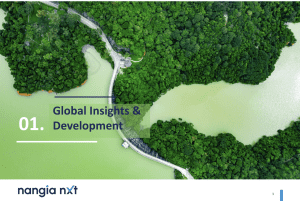

Nangia Nxt

GRI Launches Review to Enhance Labor-Related Standards, 10th June 2024
The Global Reporting Initiative (GRI) aimed at strengthening labor-related standards within sustainability reporting. GRI, known for its globally recognized Sustainability Reporting Standards, has initiated a comprehensive review to enable companies to better report on their impacts on workers and enhance transparency regarding workplace labor and human rights.
The review process, overseen by the Global Sustainability Standards Board (GSSB), begins with a consultation phase focusing on three key standards: “GRI 402: Labor/Management Relations,” “GRI 401: Employment,” and “GRI 202: Market Presence.” These standards are pivotal in addressing various aspects such as employment practices, remuneration, working conditions, and significant changes affecting workers.
Proposed new and revised disclosures cover crucial areas including non-standard forms of employment, personal data protection, gender pay gaps, and social protection coverage. Additionally, the consultations will ensure alignment with international frameworks for business and human rights, including guidelines from the International Labour Organization (ILO), United Nations, and Organisation for Economic
Co-operation and Development (OECD).
European Commission Launches European Solar Academy to Boost Net-Zero Workforce, 21st June 2024
The European Solar Academy is set to train 100,000 individuals in the solar photovoltaic (PV) value chain over the next three years. This initiative addresses critical labor and skills gaps within the sector, bolstering Europe’s capacity to meet ambitious climate targets.
This launch follows the recent adoption of the Net-Zero Industry Act (NZIA) by European lawmakers earlier this year. The NZIA introduces a comprehensive framework aimed at ramping up Europe’s manufacturing capabilities for key climate technologies. Currently, Europe relies heavily on imports for these technologies, underscoring the urgent need for domestic expertise and production capacity.
Funding for this initiative will be facilitated through the Single Market Programme, with implementation spearheaded by EIT InnoEnergy. Supported by the European Institute of Innovation and Technology (EIT), EIT InnoEnergy has been a pivotal investor in climate and renewable energy technologies since 2010. Their expertise spans critical sectors such as energy storage, transport, renewables, and sustainable infrastructure.
Denmark’s New Agricultural Climate Initiative, 27th June 2024
Denmark has unveiled a pioneering series of measures aimed at addressing the climate and environmental impact of its agricultural sector. This initiative, part of a new “Green Tripartite” agreement involving the government, environmental organizations, and agricultural sector associations and unions, underscores Denmark’s commitment to sustainability leadership.
Agriculture plays a crucial role in global greenhouse gas emissions, and Denmark’s plan includes a landmark introduction of a carbon tax on emissions from livestock starting in 2030. This carbon tax, the first of its kind globally, will initially be set at USD $17 per ton of CO2 equivalent, escalating to USD $43 by 2035. Importantly, the revenue generated will be reinvested back into the industry from 2030 to 2031, supporting a transition towards more sustainable practices.
Furthermore, the agreement includes the establishment of a USD $5.7 billion Green Area Fund aimed at initiatives like afforestation and strategic land management, alongside plans to develop 250,000 hectares of forest. Additionally, a USD$1.4 billion subsidy scheme will support biochar storage, further enhancing environmental stewardship. The government estimates these initiatives will significantly reduce emissions by 1.8 million tonnes of CO2 equivalent by 2030.
Canada Enforces Stricter Corporate Greenwashing Regulations, 27th June 2024
Canada has enacted stringent amendments to the Competition Act aimed at curbing greenwashing practices among businesses. Effective June 20, 2025, these amendments require all environmental claims made by companies to be substantiated with rigorous testing and credible evidence.
Under the new provisions:
- Product Benefit Claims: Claims regarding environmental benefits of products, such as reduced emissions or resource savings, must undergo thorough testing under controlled conditions. This ensures that claims accurately reflect real-world performance and are not misleading.
- Business Activity Claims: Statements about a company’s environmental impact, including goals like carbon neutrality or emissions reductions, must be supported by internationally recognized methodologies. This emphasizes the need for transparency and credibility in corporate environmental disclosures.
Non-compliance with these regulations carries significant penalties:
- Administrative Monetary Penalties: Up to C$10 million, with repeat offenders facing penalties up to C$15 million or 3% of worldwide gross revenues.
- Private Litigation: Starting June 2025, individuals and groups can initiate legal action against businesses suspected of making false or exaggerated environmental claims, if it serves the public interest

Uttar Pradesh Announces Bioplastic Park in Lakhimpur Kheri, 29th June 2024
- Uttar Pradesh, under Chief Minister Yogi Adityanath, has announced plans for a bioplastic park in Lakhimpur Kheri, covering 1000 hectares in Kumbhi village, Gola Gokarnnath tehsil, with an investment of approximately Rs 2 billion. This initiative aims to address environmental concerns associated with petroleum-based plastics by promoting bioplastics derived from renewable sources like corn, sugar beets, and sunflowers.
- Managed by Balrampur Chini Mill in partnership with the Uttar Pradesh Expressways Industrial Development Authority (UPEIDA), the park strategically utilizes the region’s agricultural strengths. Bioplastics, made from natural polymers such as cellulose and starches, are biodegradable and break down faster than traditional plastics, offering a more environmentally friendly alternative.
- The park is expected to stimulate the local economy through job creation and support for related industries while significantly reducing pollution compared to petrochemical plastics. It aims to become a center for research and innovation in plastic technology, focusing on enhancing recycling capabilities and minimizing plastic waste. This collaborative effort seeks to lead advancements in bioplastic production and sustainable industrial practices, positioning Uttar Pradesh at the forefront of environmentally conscious development.

Climeworks Unveils Generation 3 Direct Air Capture Technology, 5th June 2024
- Climeworks unveiled its Generation 3 direct air capture (DAC) technology, marking a significant leap forward in efficiency and performance. This advancement is pivotal in Climeworks’ ambitious plans to scale up carbon removal capacity to megaton levels.
- The new Generation 3 technology represents a paradigm shift with novel structured sorbent materials replacing traditional packed filter beds. These advancements significantly enhance surface contact with CO2, reducing capture time and improving CO2 release efficiency during storage phases. Notably, Generation 3 doubles CO2 capture per module, slashes energy consumption by half, and extends material lifespan, effectively cutting costs by 50%
- Climeworks aims to further reduce costs, targeting $250-to-$350 per ton captured and total costs of $400-to-$600 per ton net removal by 2030. The Generation 3 technology has already been successfully implemented at Climeworks’ flagship testing facility in Switzerland and will soon be deployed at scale in Louisiana as part of Project Cypress DAC Hub, supported by the U.S. Department of Energy.
Hershey Sets Ambitious Climate Goals to Reduce Emissions,
18th June 2024
- Today, Hershey, a leading producer of chocolate, candy, and snacks, announced new climate-related goals aimed at reducing emissions throughout its value chain, including Forest Land and Agriculture (FLAG) emissions.
- Scope of Emissions: Hershey’s 2023 ESG report reveals that Scope 3 emissions, originating outside its direct control, constitute about 97% of its carbon footprint, with FLAG emissions accounting for over 71% of Scope 3.
- New Targets: Hershey has committed to reducing FLAG emissions by 36% and non-FLAG Scope 3 emissions by 30% by 2030, based on a 2018 baseline. These targets represent an increase from previous goals and are validated by the Science Based Targets initiative (SBTi), aligning with the Paris Agreement’s ambition to limit global warming to 1.5°C.
- Initiatives: The company aims to achieve these goals by sourcing 80% of its electricity from renewable and zero-emission sources by 2023, implementing energy reduction targets across its facilities, and investing in sustainable practices and technology within its cocoa, dairy, and sugar supply chains. Hershey has also accelerated its commitment to achieve a deforestation and conversion-free supply chain for key commodities by the end of 2025.
Amazon’s Progress Towards Sustainable Packaging in North America, 20th June 2024
- Amazon is making a significant stride towards sustainability by replacing 95% of plastic air pillows in North American delivery packaging with paper filler. This initiative, marking our most substantial plastic packaging reduction effort in the region, aims to eliminate nearly 15 billion plastic air pillows annually by year-end. This journey began less than a year ago at our Ohio fulfillment center, the first to eradicate plastic delivery packaging. Rigorous third-party lab testing confirmed that our paper filler, made from 100% recycled content, provides equal or superior product protection.
- Moreover, the new paper filler is curbside recyclable, simplifying the recycling process for our customers. This initiative builds on our successful transition last year in Europe and Australia, where we replaced single-use air pillows with curbside-recyclable paper material. Our commitment to sustainability continues to drive our actions towards a greener future.

H&M Group Raises Concerns Over Carbon Offsetting in SBTi Net Zero Standards, 4th June 2024
H&M Group has voiced significant concerns regarding the Science Based Targets initiative’s (SBTi) plan to permit the use of Environmental Attribute Certificates (EACs), including offsetting through voluntary carbon markets (VCM), to manage Scope 3 value chain emissions in its Corporate Net Zero Standard.
Key points highlighted by H&M include:
- Focus on Absolute Emissions Reduction: H&M argues for a focus on achieving absolute emissions reductions within corporate value chains rather than relying on offsets. They emphasize that real decarbonization efforts should be prioritized to meet climate targets effectively.
- Scope 3 Emissions Challenge: While acknowledging the complexity of Scope 3 emissions, which often constitute the majority of companies’ carbon footprint, H&M stresses the importance of rigorous measurement and direct reduction efforts.
- Impact on Climate Pledges: H&M warns that relying heavily on VCM credits could weaken corporate climate pledges by diverting attention from genuine decarbonization investments and innovations.
- SBTi’s Role and Growth: Founded to establish science-based environmental target setting as a corporate standard, SBTi has seen a significant increase in validated climate targets, indicating growing global demand for credible decarbonization standards.

High Court Directs Haryana Government on Morni Hills Forest Fire, 7th June
In a recent development, the Division Bench of the Punjab and Haryana High Court, has issued a directive to the Haryana Government regarding the ongoing forest fire in Morni Hills, Panchkula. This decision stems from the case of Vaibhav Vats and other where the petitioners raised concerns about the active forest fire and its escalating impact on human life, wildlife, and ecological balance.
The court acknowledged the severity of the situation and has instructed the Haryana Government to provide detailed information on several critical aspects:
- The current status of the forest fire in Morni Hills.
- Measures undertaken by the government to contain and control the fire.
- The potential consequences of the fire spreading to nearby areas.
- The court has directed the Learned State counsel to submit a written response addressing the aforementioned points by June 11, 2024. This response will play a crucial role in assessing the government’s efforts and planning necessary actions to mitigate the impact of the forest fire.


